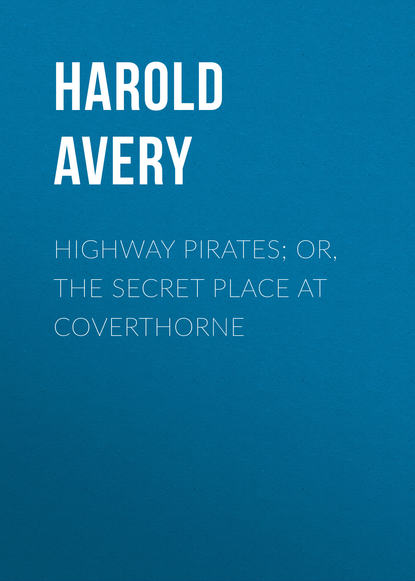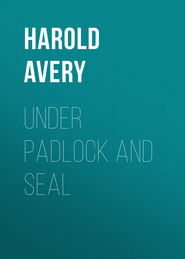По всем вопросам обращайтесь на: info@litportal.ru
(©) 2003-2024.
✖
Highway Pirates; or, The Secret Place at Coverthorne
Настройки чтения
Размер шрифта
Высота строк
Поля
"I never said I'd do anything of the kind," answered the other, rather drawing in his horns.
"Ho, ho!" sneered Liddle, perceiving his advantage, and proceeding to make the most of it; "you're funky. You try to make out that other people haven't the spirit to do a thing when really you're afraid to try it yourself."
"I'm not afraid," was the reply; "I only say it can't be done, so what's the good of gabbing about it any further?"
"It can be done," asserted Liddle. "All you have to do is to wait till there's no one about, then get out of this window on to the roof of the shed, creep along that, and down by the water-butt, then hop over the wall, and there you are. Come; you've as good as dared me to do it, and I say I'll go and ride the horse if you'll come and see me do it. Now, will you go, or will you not?"
"There's no sense in it," grumbled Rigby.
"Pooh! you mean you haven't got the pluck."
There was a general laugh. Rigby found himself in a trap of his own making. If he drew back he stood a good chance of being exposed to ridicule as an empty boaster, besides practically confessing himself Liddle's inferior in daring. His face twitched with excitement and vexation.
"Oh, very well, I'll go!" he answered desperately. "But I don't see any object in it, all the same."
An hour later, when all was quiet, the two boys, who had only partially undressed, rose, put on the rest of their clothes, and prepared to start.
"Shut the window after us, you fellows," said Liddle, "and be ready to haul us in when we return. We'll chuck a bit of mud or gravel against the glass. Don't get talking or making a row to attract attention; and mind, if any one does come into the room you're all dead asleep."
Arranging a bundle of spare clothes and pillows under their counterpanes as a last precaution, lest the notice of a master entering the room should be attracted by the empty beds, the two boys started on their expedition. The roof of the outbuilding was not far below our window, and with the assistance of a rope made of knotted towels it was reached without much difficulty. There was a whispered "All right!" and we heard the adventurers crawl away in the direction of the water-butt.
Broad awake, and in a state of suppressed excitement, we waited for what seemed hours, now and again speculating in whispers as to what had become of our two comrades, wondering if Liddle would really carry out his intention of riding the horse, and whether they would get back safely without being caught. Once the footsteps of a master passing along the corridor caused us a few moments' suspense; but we lay perfectly still, and the door of the room remained unopened. At length there came an unmistakable rap on the window-pane, the rope was lowered, and Rigby, followed by Liddle, was hauled back into the room.
"I've done it," whispered the latter, undoing the halter, which he had wound round his waist, "I caught the old nag, and had a fine scamper round the field. – Didn't I, Rigby?"
The other affirmed that such was the fact. Both boys were out of breath with running, and flushed with the excitement and success of their enterprise.
The result of the ordeal being to enhance the reputation of both, they now seemed on the best of terms, and appeared to have forgotten entirely the outburst of jealousy which had really occasioned the expedition. For some time we lay awake, listening to a detailed account of the adventure, and it must have been early morning before we stopped talking and fell asleep.
Almost before breakfast next morning a report of what had happened was whispered through the school, in consequence of which Liddle and Rigby became the heroes of the hour. Though nothing more than a piece of senseless bravado, their prank was considered a very fine and spirited exploit; indeed, when compared with the many raids and hunting expeditions of "Eagles" and "Foxes," it was declared that nothing quite so daring had been attempted for a long while.
Such an amount of notice, combined with open admiration, could not be without its effect on the two persons chiefly concerned, and by the time we retired to rest that evening both Liddle and Rigby were puffed up with conceit, and inclined to indulge in any amount of swagger.
"Now then," cried the former, "who's going to ride the old nag to-night? Come; we've given you a lead, and it's simple enough."
"I'm not going," muttered one boy, while the rest sought to evade the challenge with a laugh.
"See here," continued Liddle, in the same boastful manner, "one of you 'Foxes' have a shot. There doesn't seem to be a ha'porth of go among the lot of you! – Now then, Coverthorne, you can ride, so you're the very man. You used to be ready for a lark, but now, for all this half, you seem to have turned into a regular old woman."
Miles's cheek reddened with an angry flush.
"I'm no more a coward than you are yourself," he answered; "but if you choose to do a senseless thing, that's no reason why every one else in the room should follow suit."
"Oh, that's a fine excuse! Why don't you say at once that you're afraid?"
The dialogue was continued in much the same strain, Liddle flinging taunts with ever-increasing bitterness, till I could see that Miles was rapidly losing his temper. At length, perhaps rather weakly, the latter gave way, and declared himself ready to repeat the previous night's performance.
"I'll do it," he said, "if any one will go with me."
Just at the moment, from a boy's point of view, it seemed to me that friendship demanded that I should volunteer to share the risk.
"All right, Miles," I exclaimed. "I'll go with you; it's simple enough."
The other "Foxes" rewarded me with a subdued "Hear, hear!" For their own sakes they were eager enough for us to make the attempt, but I confess that I would gladly have recalled the promise almost as soon as it was made. From the very start, when I found myself crawling along the top of the wall against which the outhouses were built, I heartily wished myself safely back in the dormitory. Still, there was nothing to be gained by anticipating disaster until the worst actually happened, and we both pretended to make light of the whole matter. What such fellows as Liddle and Rigby had done we could certainly accomplish; and, after all, if we had an ordinary amount of luck, the risk was not great.
Miles especially was country bred, and had no difficulty in finding his way in the dark. Not a sound broke the stillness, and no one seemed to be abroad but ourselves. We pressed forward, conversing only in whispers, until in front of us a row of leafless willow trees loomed up out of the darkness.
"This is the brook," murmured Miles. "There's a plank laid across a little further down. Here we are. Now mind how you step."
Gingerly we crossed the frail bridge, not wishing to add a wetting to the other delights of this midnight raid. Two more hedges had to be scrambled through, and we found ourselves in the field in which the old horse had been turned out to graze. Away on some rising ground a little to the right was the farmhouse, and we noticed a light dimly burning in one of the windows.
"I should have thought they'd have all been in bed by this time," said Miles. "Now then," he continued, unwinding the halter, "let's find the nag. Coop, coo-op, coop!"
Whether Blackbird – as we afterwards found the animal's name was – had grown wiser by experience, and was prepared to show objection to having his night's rest disturbed to gratify the idiotic whim of a couple of schoolboys, I can't say, but the fact remains that as soon as we came within twenty yards of him he gave an indignant snort, and went plunging off in the darkness. The thunder of his hoofs on the turf seemed loud enough to be heard up at the farm. I held my breath till all was quiet again; then off we started towards the opposite end of the meadow, Miles attempting to cajole the animal with soothing words and an imaginary capful of corn. Once more Blackbird allowed us, very nearly, to drive him up in a corner; then, with a loud protestation in the shape of a neigh and a snort, he kicked up his heels and went off at a gallop. How long this sort of thing might have lasted, and whether we or the animal would have got the best of it in the end, can never be said; for before the thudding of the hoofs had ceased, a man's form came crashing through the hedge, and an angry voice yelled out, —
"Hey, you rascals! what are you doing with that horse?"
The newcomer was none other than the farmer himself, returning home from a festive gathering at the house of a friend. Passing along the footpath in the neighbouring field, he had heard our voices and Blackbird's stampede, and had come to the conclusion that he was receiving a visit from a couple of horse-thieves.
All this we learned later, but at the moment no other thought entered our minds than to save ourselves by immediate flight. We turned and ran. How we got over the hedges I don't know; I can only remember plunging through them, regardless of scratches and tumbles, as a bather might through a breaking wave. Old Smiley, who had the advantage of knowing the ground better than we did, followed hard at our heels, breathing out threats and curses. If the man had had a gun in his hand, I believe he would certainly have fired.
Suddenly we found ourselves on the bank of the stream. As luck would have it, we happened to have struck it just at the right spot, and Miles's ready wit came to the rescue.
"Quick!" he panted; "over, and draw away the plank, or the beggar will follow us to the school!"
Recklessly we sprang across the narrow bridge; then seizing the plank, with our united strength dragged it over, flung it down on the bank, and rushed off into the darkness.
The ruse proved entirely successful. Though a good runner, old Smiley was not going to attempt a jump with the risk of a ducking. We heard his shouts growing fainter and fainter in the distance, and a few minutes later we had scrambled along the roof of the outhouses, given the signal, and were being hauled up to the window by our comrades, who were on the qui vive awaiting our return.
In a few breathless sentences Miles explained what had happened.
"It's all right!" said Liddle reassuringly. "You gave the old beggar the slip finely, and he can never tell that it was two fellows from here. In the darkness he didn't get close enough to recognize your faces."
During the time these few words were being spoken I had been sitting on the end of my bed, endeavouring to regain my breath sufficiently to take part in the conversation. Now raising my hand to take off my cap, I found that it was missing. At once the thought flashed through my mind that I must have dropped it during my flight across the fields, and, what was more, I remembered that my name was clearly marked on the lining. If any of my room-mates had been watching me closely, they must have seen my face lengthen; for should old Smiley or one of his men happen to pick up the cap, it was as good as if they had caught the owner, and my share in the horse-chasing adventure would certainly be discovered.
CHAPTER VII.
TRIED AND SENTENCED
Every thoughtful person will have remarked how the important events in life are often led up to by some incident or mischance of the most trivial kind; and so this story of mine would, in all probability, never have been written if it had not been for the accidental dropping of my cap in the course of that senseless night adventure.
"Had you got it on when you crossed the brook?" asked Miles, when I explained what had happened. "D'you think you dropped it climbing up to the window?"
In answer to these inquiries I could only shake my head. From the time the farmer surprised us in the field I could only recall a vague impression of our wild scamper through the darkness.
"Oh, it's all right," said Rigby. "I expect it fell off when we were hauling you from the roof of the shed. If so, you can easily get it in the morning."
With that the talk ended, and we scrambled into bed. We had certainly silenced our enemies, and covered ourselves with a questionable kind of glory, by our escapade, for even Liddle admitted that our pluck could no longer be doubted. Yet, as I continued to lie broad awake, staring into the darkness long after my companions had fallen asleep, I was far from easy in mind or satisfied with the result of the adventure.







